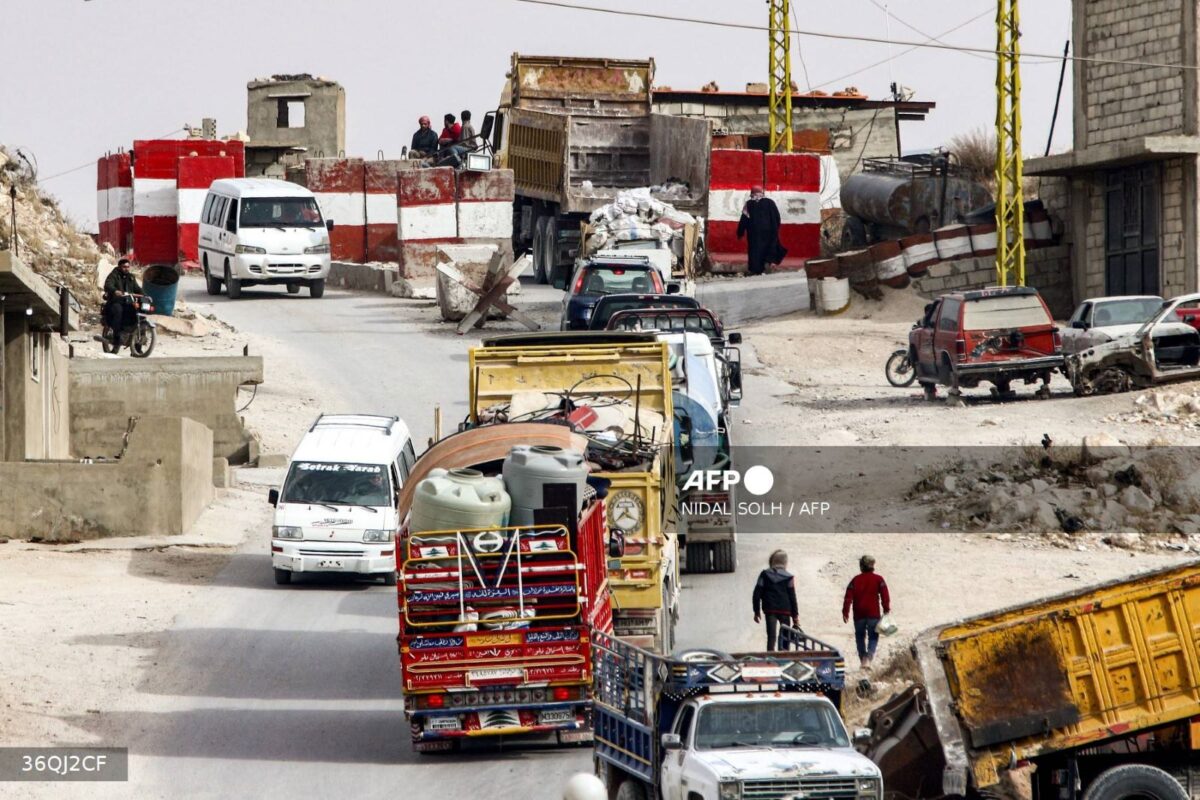
Although Syria still faces many challenges, the Syrian community in Lebanon now has hope for the future for the first time in years now that Assad’s rule is over, a moment many had long waited for, with many eager to finally reclaim the lives and futures they were forced to leave behind.
Abou Ahmad Al Hamwi left Ain Tarma, on the outskirts of Damascus Syria in 2011 following the Syrian war to work as a painter in Lebanon in the Bekaa Valley.
“We still cannot believe it, now I can freely talk to my family back home and dare to return and build my life again in my country,” Abou Ahmad said.
Death toll estimates from the war are as high as 620,000, a staggering number in a country with a prewar population of 22 million with more than 14 million Syrians forced to flee their homes.
Although many concerns for the future remain, for now, there is simply an overriding sense of relief and optimism.
“We look forward to a better life and a better future for Syria and we hope to see our country bloom again without the horrendous Assad regime.” Said Abou Ahmad.
During NOWS interviews with Syrians in Lebanon after the fall of the Assad regime, what they all had in common was their joy and relief with a repetitive statement “nothing is going to be worse than the Assad regime.”
The Lebanese authorities have not yet disclosed any reliable figures on the number of Syrians that have returned but they have said that they’ve seen a staggering increase in demand for voluntary returns.
An entire generation of Syrians has never known freedom and so when it swept over them last Sunday after 50 years of dictatorship, many have felt that they were dreaming and some are finally able to return after years of being away from their country.
NOW spoke to Abdallah, Abu Ahmads relative who also lived in Lebanon.
“The ruins run for miles in every direction in the suburbs of Ain Tarma and this is what you would see in almost every Syrian city,” Abdallah, told NOW after he visited his neighborhood for the first time in 9 years.
“This was Bashar Al Assads answer to the unarmed protests when we rose against his regime demanding freedom and basic rights, to destroy entire neighborhoods and bombard civilians, but hopefully we will rebuild our neighborhoods again without the posters of the monsters Bashar and Hafez.” Abdallah explained after witnessing the scenes of damage and ruins.
Joy overshadowed by grief
Assad’s army hallowed out by corruption simply ran away, and the dictator fled to Moscow, but many Syrian families are still drowning in sorrow with their hearts aching with the pain of not knowing the fate of loved ones still missing or grappling with the cruel reality of receiving death certificates without the return of a body.
For nearly the past week forensic pathologists have been comparing photos and teeth, and the pressure from the families is increasingly overwhelming, desperate to find proof of the dead.
“You do not know the relief we feel after the fall of this brutal regime, we have not been able to speak of politics above a whisper,” said Rahaf Machnouk, a teacher based in Syria to NOW.
With the tough memories many Syrians have of the Assad family, they want to get him out of their minds just like they got him out of Syria. Peace and freedom now seem to be in the heart of many.
Still hopeful
Omar Arnous, a 23-year-old Syrian who works as a delivery man in Lebanon told NOW that he and his family have been longing for this sense of joy and hope, but this was overshadowed by the scenes they have been seeing at Assad’s notorious prisons and mass graveyards.
“I will be going back to Syria next week in the hope of searching for my brother, who has been missing since 2013 when the regime abducted him at a checkpoint where he was working as a school bus driver for a living.” Omar explained to NOW.
At that time this is what the regime told the family, whilst warning them to stop asking about his brother Khaled, but now with Syria being freed from the Assad regime, Omar is hopeful that he will find a trace of his brother, at least his body if he is dead.
An emotional time for both nationalities
While the fall of the regime brought tears of joy to the Syrian community in Lebanon, many Lebanese also welcomed the news with celebration, a sense of victory, and renewed hope, a moment both nationalities had long anticipated.
Speaking from Mukhtara, Chouf, Jawad Zeidan whose father was killed by the Syrian military in Lebanon expressed a deep sense of victory and relief following the fall of Bashar Al-Assad.
“I come from a village whose great leader was assassinated by the Syrian regime under Hafez Al-Assad, so this is undoubtedly a significant and historic moment for us,” said Jawad, referring to Ex-Druze leader Kamal Jumblatt.
“I thank god that my fathers blood had not been gone to waste and that the Syrian revolution and demanders of freedom had won over this brutal and dictatorship regime that killed thousands and thousands of Lebanese and Syrian civilians,” Jawad told NOW.
Additionally, a similar sentiment was echoed in Lebanon’s Tripoli, where thousands gathered last week to celebrate this extraordinary day, seeing it as a day of justice and the end of a nightmare imposed upon them by the regime.
“To the people of Syria: Your victory is our victory. Your freedom is our freedom. Today, we celebrate with you, not just as neighbors but as brothers and sisters where we can finally begin to heal,” Sahar Nehme, a geography school teacher whose father was abducted in the 1980s by the Assad regime and till now they do not know anything about his fate.
This story is not unique, it is shared by countless Lebanese families, whose lives were shattered under the Syrian regime’s occupation.
Rodayna Raydan is a Lebanese-British journalist. You can follow her on Twitter @Rodayna_462
The views in this story reflect those of the author alone and do not necessarily reflect the beliefs of NOW.








